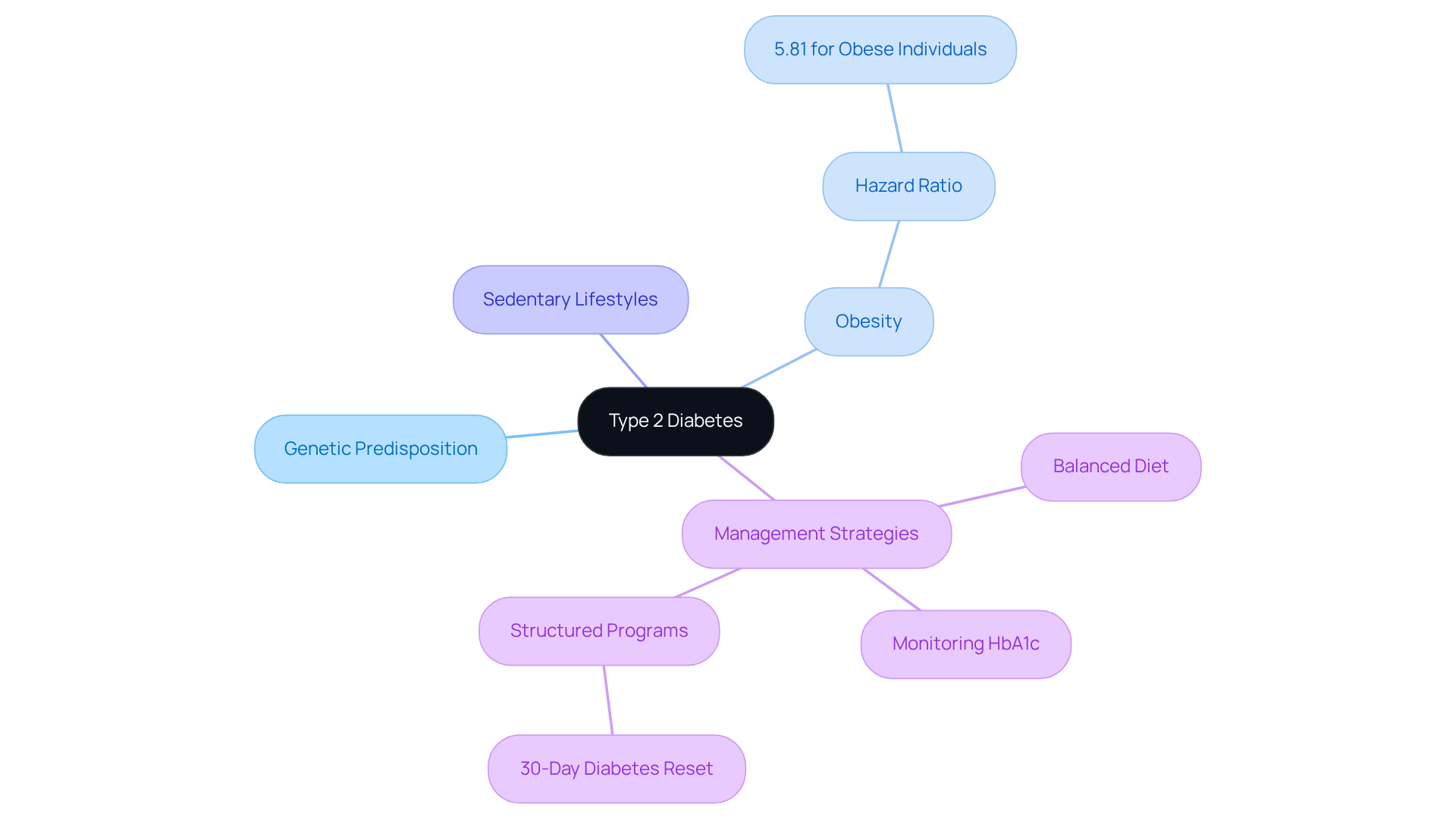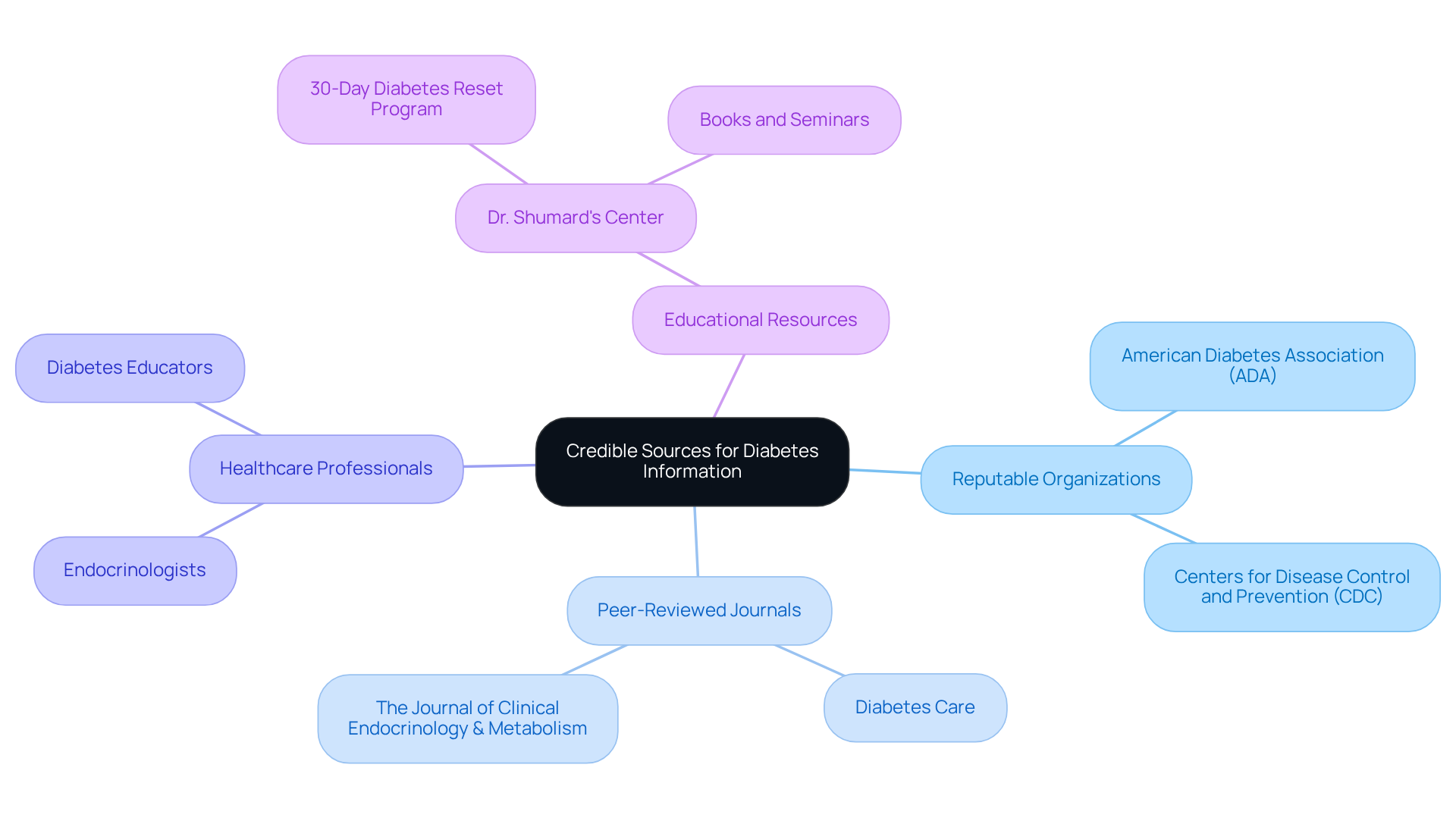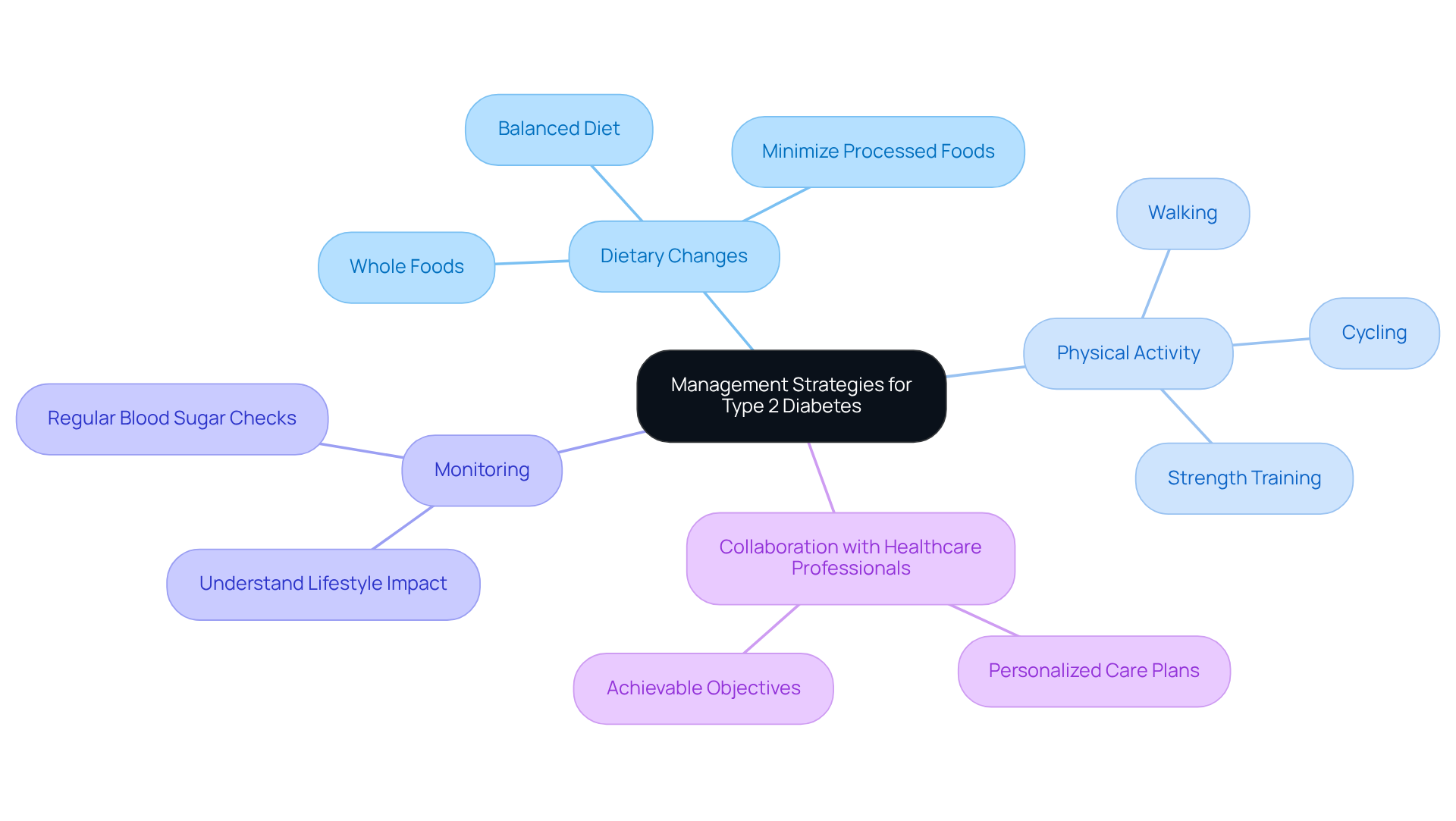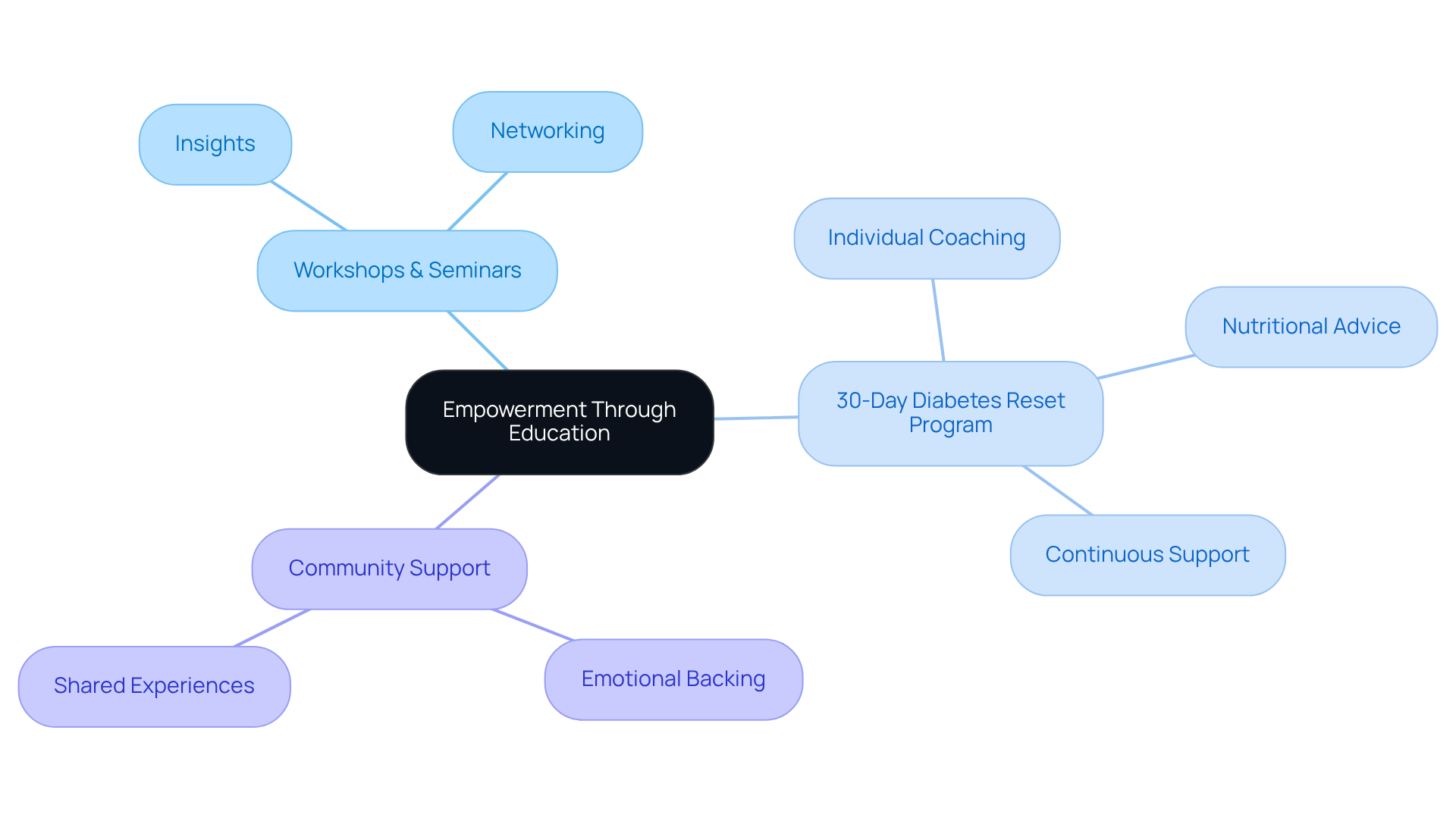Overview
Managing type 2 diabetes can feel overwhelming at times, but understanding its causes, recognizing symptoms, and making lifestyle changes like improving diet and incorporating exercise can make a significant difference.
It’s important to recognize that education, credible resources, and community support play a vital role in navigating this journey. Many patients find that connecting with others who share similar experiences can provide comfort and encouragement.
Statistics highlight the prevalence of diabetes, but also the positive outcomes from structured programs, such as the 30-Day Diabetes Reset, which can help you take control of your health.
Remember, you are not alone in this journey, and there are supportive pathways available to help improve your condition.
Introduction
Understanding type 2 diabetes is crucial, as it affects millions worldwide. Yet, many individuals remain unaware of its complexities and the strategies for effective management. It’s important to recognize that this condition can feel overwhelming, and you are not alone in your journey. This article delves into essential information about diabetes, focusing on compassionate management techniques and the significance of credible resources.
With alarming statistics predicting a dramatic rise in diabetes cases, many patients find themselves asking: how can they empower themselves to navigate this health crisis and improve their well-being? Together, we can explore ways to foster a healthier lifestyle and support each other in this endeavor.
Understand the Basics of Type 2 Diabetes
There is a significant amount of information on type 2 diabetes, which is a long-term condition that many people face and is characterized by insulin resistance. This means that the body’s cells do not respond properly to insulin, leading to increased blood sugar levels. Understanding this mechanism is crucial for effective disease management, especially for those who need information on type 2 diabetes while navigating this journey.
It’s important to recognize that key contributors to type 2 diabetes, as detailed in the information on type 2 diabetes, include:
- Genetic predisposition
- Obesity
- Sedentary lifestyles
Recent studies indicate that obesity significantly elevates the risk of developing type 2 sugar intolerance, with a hazard ratio of 5.81 for obese individuals compared to those with normal body weight. Furthermore, lifestyle elements like physical inactivity worsen this risk, emphasizing the need for proactive wellness measures. The International Diabetes Federation estimates that by 2050, around 853 million adults will be living with diabetes, highlighting the urgency of tackling this escalating medical crisis.
For patients, understanding information on type 2 diabetes, including essential terms like HbA1c and fasting glucose levels, is vital, as these are critical for monitoring their condition. Maintaining a balanced diet directly influences blood sugar control, which can feel overwhelming at times. Identifying signs like heightened thirst, frequent urination, and fatigue, along with seeking information on type 2 diabetes, can aid in early detection and swift handling of the disease. Have you noticed any of these signs in yourself or a loved one?
Real-world examples show that lifestyle changes can lead to substantial enhancements in well-being. For instance, participants in structured programs, like the 30-Day Diabetes Reset, have reported life-changing outcomes by adopting healthier habits. Testimonials from these patients highlight the effectiveness of the program, reinforcing the center’s commitment to personalized care and education over mere symptom management. By grasping these fundamentals, individuals can navigate their health journey more effectively and make informed decisions regarding their treatment options, including seeking information on type 2 diabetes. Remember, you are not alone in this journey, and there are resources available to support you.
Identify Credible Sources for Diabetes Information
Managing type 2 health issues can feel overwhelming, and it’s essential to rely on credible sources of information on type 2 diabetes. Reputable organizations such as the American Diabetes Association (ADA) and the Centers for Disease Control and Prevention (CDC) offer evidence-based guidelines and resources, including information on type 2 diabetes, to support you.
Did you know that over 100 million adults in the U.S. are living with blood sugar conditions or prediabetes? This statistic highlights just how important it is to access reliable information on type 2 diabetes. Furthermore, the total estimated costs of diagnosed diabetes in the U.S. in 2022 reached a staggering $412.9 billion, underscoring the urgency of effective management strategies.
Many patients find that peer-reviewed journals and publications from recognized experts provide valuable insights. However, it’s wise to be cautious of anecdotal advice found on social media or unverified websites. Engaging with healthcare professionals, attending seminars, and participating in support groups can greatly enhance your understanding and provide access to trustworthy information on type 2 diabetes.
For instance, Dr. Shumard’s center offers educational resources, including books and seminars, designed to empower you on your health journey. By prioritizing credible sources, you can ensure you are following the best practices for managing your condition and taking steps toward a healthier future.
Implement Effective Management Strategies for Type 2 Diabetes
Managing type 2 diabetes can feel overwhelming, but having the right information on type 2 diabetes can help you recognize that you’re not alone in this journey. A multifaceted approach that includes dietary changes, physical activity, and regular monitoring of blood sugar levels can provide important information on type 2 diabetes and make a significant difference. Patients are encouraged to gather information on type 2 diabetes by aiming for a balanced diet rich in whole foods, such as vegetables, lean proteins, and whole grains, while minimizing processed foods and sugars.
Many patients find that incorporating regular physical activity—whether it’s walking, cycling, or strength training—can provide important information on type 2 diabetes while significantly enhancing insulin sensitivity and overall well-being. Additionally, monitoring blood glucose levels regularly provides important information on type 2 diabetes, helping individuals understand how their lifestyle choices affect their condition. Establishing achievable objectives and collaborating with healthcare professionals to develop a personalized care plan can lead to lasting improvements and better health outcomes, which may include important information on type 2 diabetes.
Did you know that over 30 million individuals in the U.S. are impacted by this condition? This statistic underscores the significance of effective management strategies. Dr. Jason Shumard emphasizes that even minor changes in diet and exercise can yield substantial benefits, highlighting the importance of proactive management and providing information on type 2 diabetes for maintaining a healthy lifestyle.
Furthermore, the center offers a comprehensive 30-Day Reset program designed to equip patients with the essential tools and knowledge, including information on type 2 diabetes, to transform their health and manage their condition effectively. Taking the first step toward a healthier you can be empowering, and we’re here to support you every step of the way.
Empower Yourself Through Education and Support
Empowerment through education is essential for individuals who need information on type 2 diabetes to navigate its challenges. It’s important to recognize that participating in workshops, seminars, and support groups not only provides valuable insights but also fosters a sense of community among patients. Dr. Jason Shumard’s center offers the comprehensive 30-Day Diabetes Reset program, aimed at equipping patients with essential knowledge and practical tools for effective diabetes care. This program provides individualized coaching, nutritional advice, and continuous support to assist patients in reaching their wellness objectives.
Many patients find that educational resources provide valuable information on type 2 diabetes, including Dr. Shumard’s books and articles, which enhance their understanding and introduce new coping strategies. Connecting with individuals who share comparable experiences can offer emotional backing and encouragement, highlighting the significance of community in overseeing well-being.
Did you know that only 52% of adults with diabetes reported receiving diabetes education? This statistic underscores the critical need for accessible resources. By actively pursuing education and support, individuals can take control of their health, leading to an improved quality of life and better management of their condition.
Conclusion
Understanding and managing type 2 diabetes can feel overwhelming, but it is a journey that many embark on with the right support and knowledge. It’s important to recognize the fundamentals of this condition, including the role of insulin resistance and how factors like obesity and sedentary lifestyles contribute significantly to its prevalence. By fostering awareness and knowledge, you can take proactive steps toward better health outcomes.
Key insights discussed include:
- The necessity of credible information sources
- The impact of lifestyle changes
- The value of community support
Many patients find that engaging with reputable organizations, participating in educational programs like the 30-Day Diabetes Reset, and connecting with others facing similar challenges can empower them to manage their condition effectively. Moreover, understanding critical health metrics, such as HbA1c and fasting glucose levels, is essential for monitoring progress and making informed decisions.
Ultimately, the path to effectively managing type 2 diabetes is illuminated by education and support. Individuals are encouraged to:
- Seek out trustworthy resources
- Actively participate in their health journey
- Foster connections with healthcare professionals and peers
By doing so, you can transform your understanding of diabetes into actionable strategies that lead to improved health and a better quality of life. Taking charge of your health is not just beneficial; it is essential for navigating the complexities of type 2 diabetes with confidence and resilience.
Frequently Asked Questions
What is type 2 diabetes?
Type 2 diabetes is a long-term condition characterized by insulin resistance, where the body’s cells do not respond properly to insulin, leading to increased blood sugar levels.
What are the key contributors to type 2 diabetes?
Key contributors include genetic predisposition, obesity, and sedentary lifestyles.
How does obesity affect the risk of developing type 2 diabetes?
Obesity significantly elevates the risk of developing type 2 diabetes, with a hazard ratio of 5.81 for obese individuals compared to those with normal body weight.
What lifestyle factors can worsen the risk of type 2 diabetes?
Physical inactivity is a lifestyle factor that can worsen the risk of developing type 2 diabetes.
What is the projected prevalence of diabetes by 2050?
The International Diabetes Federation estimates that around 853 million adults will be living with diabetes by 2050.
Why is it important for patients to understand terms like HbA1c and fasting glucose levels?
Understanding these terms is vital for monitoring their condition and managing type 2 diabetes effectively.
What dietary factors influence blood sugar control in type 2 diabetes?
Maintaining a balanced diet directly influences blood sugar control.
What are some common signs of type 2 diabetes?
Common signs include heightened thirst, frequent urination, and fatigue.
How can lifestyle changes impact well-being for those with type 2 diabetes?
Lifestyle changes can lead to substantial enhancements in well-being, as evidenced by participants in structured programs like the 30-Day Diabetes Reset.
What resources are available for individuals managing type 2 diabetes?
There are various resources available to support individuals in their health journey, emphasizing personalized care and education.



